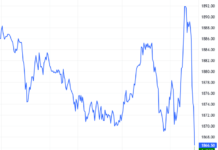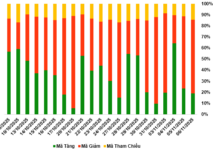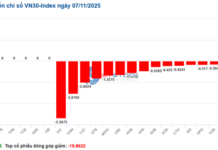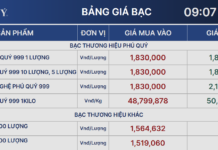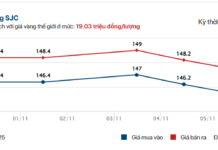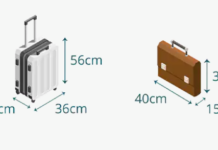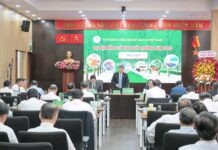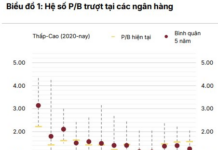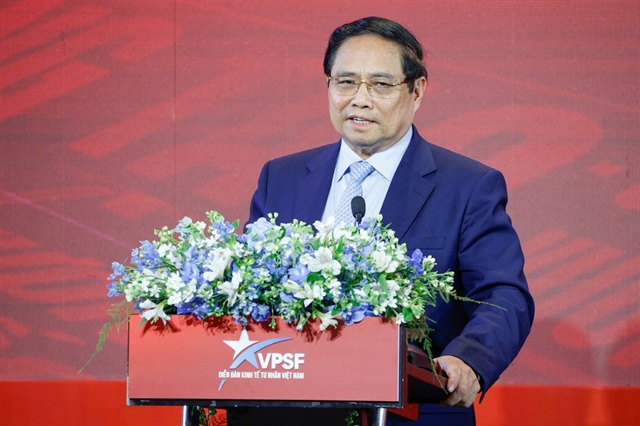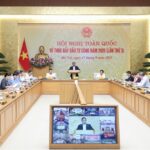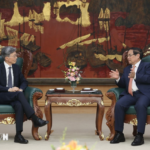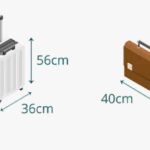Addressing the audience, Prime Minister Pham Minh Chinh highlighted the rapidly evolving, complex, and unpredictable global and regional landscape. He noted the uneven recovery of the global economy, intensifying strategic competition, lingering supply chain disruptions, and intertwined pressures from inflation, trade, and financial-monetary policies.
Vietnam’s Economy in the New Global Context
According to the government leader, in the first eight months of 2025, Vietnam’s socio-economic landscape continued its positive trajectory, with each month outperforming the previous one and the overall eight-month performance surpassing the same period last year. Macroeconomic balances were maintained, and market confidence was strengthened.
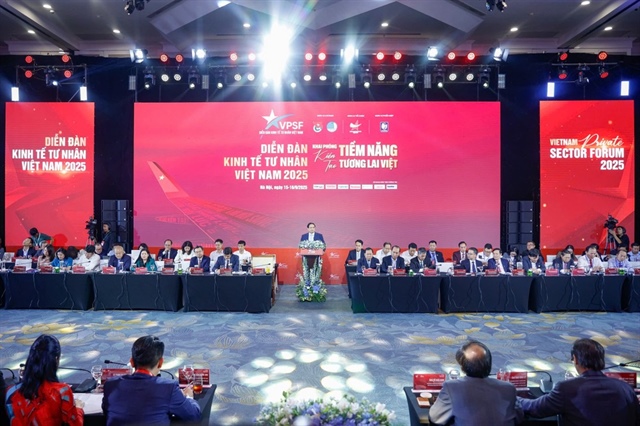
Prime Minister Pham Minh Chinh speaking at the event. Photo: CTV |
However, alongside these opportunities, Vietnam faces new challenges stemming from geopolitical shifts, external risks, and policy adjustments in trade and technology by major partners. This necessitates proactive adaptation, market restructuring, supply chain realignment, increased technological integration, and localization across products, industries, and regions.
He emphasized that the government has been, is, and will continue to flexibly manage and effectively coordinate policies. The focus remains on macroeconomic stability, inflation control, growth promotion, and social welfare.
Additionally, efforts are concentrated on removing bottlenecks in institutions, infrastructure, and human resources; accelerating administrative reforms; improving the business investment environment; and activating new growth drivers.
For the final four months of 2025, Vietnam remains committed to its goals, revitalizing the three traditional drivers (investment, consumption, and exports) alongside new ones (digital transformation, green transition, and circular economy). The aim is to mitigate external impacts and sustain momentum in production, exports, tourism, services, and agriculture, striving to achieve the highest possible 2025 targets.
Looking ahead to 2026, amidst global uncertainties, international organizations remain optimistic about Vietnam’s prospects, provided it maintains macroeconomic stability, accelerates institutional reforms, develops strategic infrastructure, enhances human resource quality, and drives innovation and digital-green transformation. These efforts will boost productivity, quality, efficiency, and the economy’s competitiveness.
Three Key Focus Areas to Elevate the Private Sector’s Role
Discussing key areas to enhance the private sector’s role, Prime Minister Pham Minh Chinh first emphasized institutions, laws, and law enforcement.
He directed ministries and agencies to urgently review and resolve overlaps, conflicts, and inadequacies in laws related to investment, land, construction, and business. The shift from ex-ante to ex-post checks, based on risk management, should be accelerated, along with reducing administrative procedures and compliance costs for businesses.
The resolute implementation of National Assembly Resolution 198 and Government Resolution 139’s Action Plan is crucial. Tasks, timelines, and accountability should be publicly disclosed on information portals, with a focus on leadership responsibility.
In the immediate term, the Ministry of Justice will lead a task force for legal codification and overlap resolution. Pilot mechanisms (sandboxes) will be explored in specific areas to foster innovation while ensuring safety and risk control.
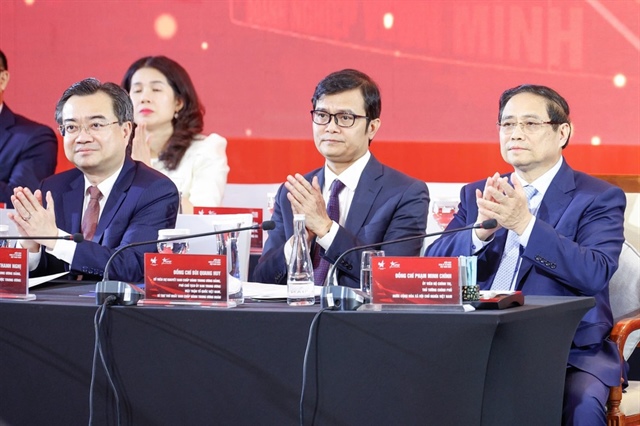
Prime Minister Pham Minh Chinh with event attendees. Photo: CTV |
Second, regarding science, technology, innovation, and digital transformation, the Ministry of Science and Technology will lead the implementation of the Digital Technology Industry Law. Regional innovation centers will be established, focusing on semiconductors, artificial intelligence, and data security.
Crucially, the “government-academia-scientists-business” linkage must be strengthened along value chains. Businesses should be at the heart of innovation, with robust mechanisms for research commissioning and commercialization.
Third, on international integration, markets, and supply chains, the Prime Minister stressed diversifying import-export markets and deeper participation in regional and global production networks and supply chains.
This includes enhancing trade defense capabilities, leveraging new-generation FTAs, and promoting green-digital transitions aligned with international standards. National branding for key products will also be prioritized.
The Ministry of Foreign Affairs, Ministry of Industry and Trade, and relevant agencies must proactively and effectively implement the Integration Resolution, linked to specific action programs.
Fourth, addressing persistent business bottlenecks, the Prime Minister highlighted finance and credit. The State Bank, in collaboration with the Ministry of Finance, will expand credit guarantees for SMEs and green credit. Non-traditional collateral mechanisms, such as cash flows and contracts, will be cautiously explored to ensure systemic safety.
On land and production sites, localities will increase clean land funds suitable for SMEs in industrial and cluster zones, improving compensation and land clearance processes.
For human resources, the Ministry of Home Affairs and Ministry of Education will accelerate digital skill standards and modern management training, expanding enterprise-ordered training models. In infrastructure and logistics, the Ministry of Construction will expedite inter-regional projects to reduce logistics costs, a key business concern.
Ending Fragmented, Small-Scale Production Mindset
Representing the business community, Pham Minh Thong, Chairman of Phuc Sinh Group, praised the government’s policies and incentives for the private sector but noted remaining bottlenecks.
Thong pointed out that while Vietnam’s agriculture has advanced, it remains fragmented and small-scale.
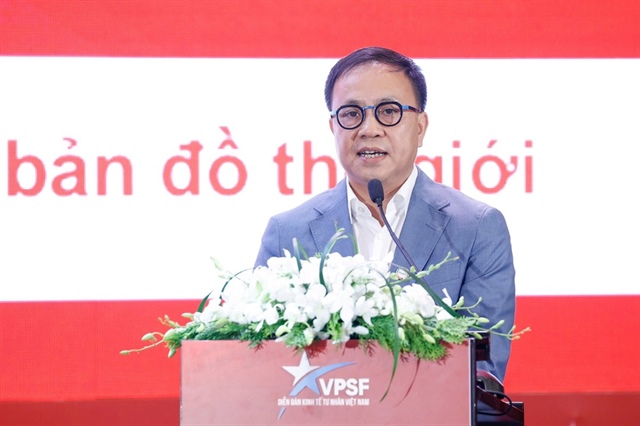
Pham Minh Thong, Chairman of Phuc Sinh Group. Photo: CTV |
Vietnam produces many top global agricultural commodities but lacks control over pricing, resulting in lower prices than deserved. As a major exporter of agricultural and raw materials, Thong highlighted VAT inefficiencies.
Specifically, the 5% VAT from July 1 to September 30 requires businesses to pay taxes, export, and then reclaim refunds—a lengthy, multi-step process burdening both tax authorities and businesses.
Vietnam’s agricultural mindset must shift. Domestic products should meet export-quality standards, ensuring consumers access clean, high-quality goods. Comprehensive planning is needed, linking production facilities with raw material regions for fresh, top-quality agricultural output.
NGOC DIEP
– 20:51 16/09/2025
Enhancing Internal Control, Audit, and Inspection in Credit Institutions
To ensure the safety, sustainability, and legal compliance of the financial system, the State Bank of Vietnam (SBV) regularly issues notifications and warnings to credit institutions through its supervisory, inspection, and monitoring activities. These communications emphasize strict adherence to legal regulations, SBV guidelines, and directives from relevant authorities.
Prime Minister: Ensuring 100% Disbursement of Public Investment Capital
On the morning of September 17th, Prime Minister Pham Minh Chinh and Deputy Prime Ministers chaired the 3rd National Conference on Accelerating Public Investment for 2025. The Prime Minister mandated the full disbursement of 100% of the 2025 public investment capital, emphasizing improved investment quality and zero tolerance for corruption, negativity, or waste. Public investment is to be leveraged as a key driver for growth, job creation, sustainable livelihoods, and enhanced living standards for the people.
Prime Minister Requests IMF to Continue Policy Advisory and Risk Warnings for Vietnam
Prime Minister requests the IMF to further strengthen cooperation, technical assistance, and human resource training for Vietnam, while implementing programs to support Vietnam’s adaptation to new international economic conditions.
Unlocking the 1,000-to-2 Ratio: Prof. Dr. Mạc Quốc Anh’s Blueprint for Fostering Entrepreneurship
According to Mr. Quốc Anh, Resolution No. 68 has delivered a significant boost by mandating a reduction of over 30% in administrative procedures, thereby creating new space and opportunities for private enterprises to thrive. Additionally, the banking system has committed to providing preferential capital and easing lending conditions to support the private business sector.

